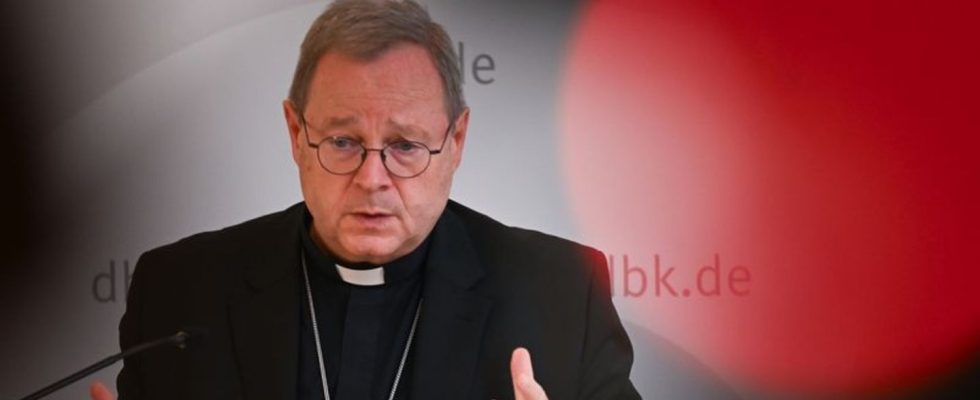Church
Bishops want to circumvent financial blockade by conservatives
The chairman of the German Bishops’ Conference, Georg Bätzing, comments on the conclusion of the autumn general assembly in Wiesbaden. photo
© Arne Dedert/dpa
The majority of German bishops want to permanently involve lay people – ordinary believers – in decisions in the future. Four conservatives had blocked the money for this synodal committee.
A large majority of Catholic The dioceses want to ensure long-term cooperation with the laity in a new decision-making body and provide funds for this.
Several dioceses are currently discussing the establishment of their own legal entity that will “collect, manage and spend the necessary funds in accordance with the mission,” said the chairman of the German Bishops’ Conference, Georg Bätzing, at the end of the autumn general assembly in Wiesbaden.
Cologne Cardinal Rainer Maria Woelki and other conservative bishops are blocking the financing of the Synodal Committee using resources from the Bishops’ Conference. However, a solution to the problem is now emerging by outsourcing the financing to a new legal entity outside the bishops’ conference. 23 of the 27 dioceses then provide money for this. The Synodal Committee is scheduled to meet for the first time in Essen on November 10th and 11th.
Synodal Council should be created
In March, the German Catholics had initially completed their three and a half year Synodal Path reform process. One of the most important results was that synodality – joint consultation and decision-making – should continue. The Synodal Committee should clarify what this could look like over the next three years.
Afterwards, a synodal council should be created in which lay people have a permanent, equal say. The Vatican has already made it clear that it views such a body very critically. The four bishops who are against it also refer to this. In addition to Woelki, these are Gregor Maria Hanke from Eichstätt, Stefan Oster from Passau and Rudolf Voderholzer from Regensburg. However, the vast majority of the bishops’ conference is sticking to the plans.
The bishops’ conference also reacted to a provocative greeting from Pope Ambassador Nikola Eterovic. The nuncio, who represents the Vatican to the federal government, had warned the bishops gathered in Wiesbaden about gender “ideology”.
Bätzing said that it had been pointed out to Eterovic “that the harsh language images were not suitable for remaining capable of conversation in a changing world.” When Eterovic uses the term “gender ideology,” it reminds him of Kulturkampf, said Bätzing. “And if the church engages in a culture war, it will always lose.” Woodcut-like terms such as those used by the nuncio, which already contain aggression, would not help, said Bätzing.
Warning from the bishops
When asked whether bishops should still take part in the so-called “March for Life” in the future, even though right-wing radicals are also taking part there, Bätzing said: “Every bishop has to decide whether he wants to take part in the March for Life and every bishop who takes part should “We know that there is no uniform clientele that is there and that there are certainly groups that use the participation of bishops for their own propaganda.” For several years now, he has limited himself to writing a greeting for the event because there he can differentiate between what he supports and what he doesn’t.
Regarding the AfD, Bätzing said in writing: “We bishops are campaigning to ensure that our country does not become an alternative Germany that becomes xenophobic, anti-European and nationalistic.” The bishops also criticize pushbacks at Europe’s external borders as being contrary to international law. “The legitimate concern to control borders and combat smuggling crime must not lead to the rights of those seeking protection being undermined,” it says.
There is no doubt that accepting large numbers of refugees is associated with major challenges. “However, it would be fatal to follow the populists’ slogans in any way,” warned the bishops after their deliberations. “In the heated debate currently taking place in Germany, there is often a lack of empathy towards people seeking protection.”

